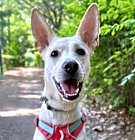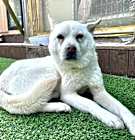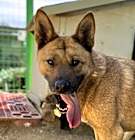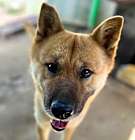Color
White - with Tan, Yellow or Fawn
Size
(when grown) Med. 26-60 lbs (12-27 kg)
Details
Not good with kids
Good with dogs
Not good with cats
Spayed or Neutered
Shots are up-to-date
Story
Hi! My name is Bianca, and I am IN SOUTH KOREA waiting to be matched to a home in Los Angeles! I was rescued from the dog meat trade in South Korea by the DoVE Project. My fate would have been to live in fear and distress, watching dogs being led to slaughter for human consumption. DoVE Project heard about me, and now I am looking for my forever family!
ID/NAME: CARE23-055 / Bianca
SEX/WEIGHT/AGE: Female / 24.3 lbs / 11 months (as of March 1st)
BIRTH DATE: April 1st, 2023
BREED: Jindo mix
VACCINATIONS/SPAY/NEUTER/HEALTH: Vaccinations complete / Spayed / Healthy
BEHAVIOR:
Bianca is a playful pup with lots of energy. Bianca loves people and enjoys getting attention and seeks lap cuddles. She gets along well with other dogs and loves to play with them, but prefers her own space when she's eating. Bianca has been doing well walking on a leash and will be a great companion for walks!
SIBLINGS/FAMILY: Basil, Cady, Penny and others
BACKGROUND: In June 2023, Watchdog conducted a raid on a notorious slaughterhouse in Cheonan, infamous for its brutal and inhumane methods of animal slaughter - particularly, the horrific practice of hanging - which had been ongoing for over three decades. The conditions within the aged facility were nothing short of devastating. Puppies were seen tumbling from suspended cages onto heaps of waste, as their helpless mothers could do nothing but watch in despair. Numerous other puppies cried out in distress, their tiny feet caught in the bars of their cages. Both dogs and goats showed clear signs of severe malnutrition. Food and water bowls were filthy with old food scraps. A thorough investigation by Watchdog uncovered substantial evidence of the harsh conditions and animal mistreatment within the facility. This evidence led the authorities in Cheonan to intervene and the owner was forced to relinquish ownership.
ABOUT JINDOS
Jindos are known for their fierce loyalty, high intelligence, rarely barking, and playful nature. They make great indoor family dogs, as Jindos are clean and easily housetrained, and are faithful to family members. They are also mid-level active and love being socialized at dog parks, going on hikes, and joining the family on trips.
ABOUT SHELTER STRESS
Dogs who have lived in shelters for a long period of time develop behaviors due to an environment that is loud, chaotic, and stressful, even in best shelters in the US. Dogs in shelters have limited socialization exposure to people and urban environments. DoVE dogs also come from a traumatic background such as dog meat farms and slaughterhouses. While many of our dogs acclimate within a few months with consistency, structure, and patience, some of our more sensitive dogs can take longer to rehabilitate. It's important to note that these sensitive dogs are even more attuned to human emotions and behavior, making for a deeper connection human-dog connection. DoVE Project is committed to helping our adopters desensitize and socialize our dog meat trade survivors.
*********************************
DoVE Project operates a shelter in South Korea, where our dogs stay until they are matched with an adopter. In the US, our dogs stay in foster homes or in boarding, as we do not have a physical facility. These dogs are identified with "in LA" in their names.
Please note that we only adopt our pups in the Southern California area. Please check our website for more information regarding our adoption process, our mission, and adoption application: https://www.dove-project.org/adoption-process
If you are interested in adopting, please complete an online application at: https://www.dove-project.org/adoption-application-form.













